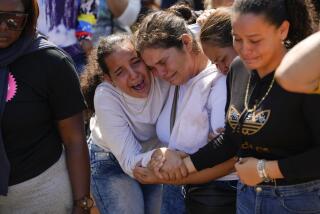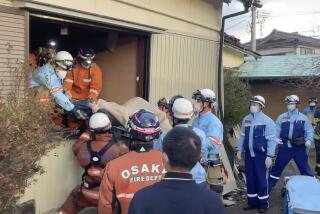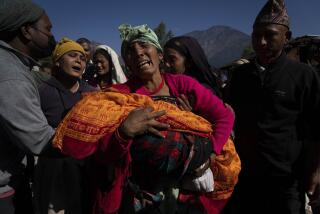Shaken Street Digs Out, Says Final Goodbyes
VILLA DE ALVAREZ, Mexico — In this little town, Wednesday was a day for digging: the backbreaking excavating of collapsed houses, and the heartbreaking shoveling of graves.
In one three-block area along Calle Guillermo Prieto, named for the 19th century poet of the people, at least four people died in houses tossed as if by heaving waves and then smashed back to Earth in piles of rubble as Tuesday’s massive earthquake shook Colima state.
“There are many funerals today,” said Fabiola Flores Chavez, 32. “Walk up the street and you’ll see where the houses have fallen.”
The first neighborhood victim discovered was Socorro Virgen Larios, 50. A rescue worker and a black labrador named Grizzly found her amid the ruins of her house just after the earthquake hit.
Half a block up, the family of Daniel Gonzalez Rosales gathered around his coffin Wednesday afternoon.
Gonzalez Rosales was 99, and he was born in the blue rancho-style house on Calle Guillermo Prieto that collapsed on him Tuesday. His family said he had survived a life of hard work, illness and two bullets in the chest as a young man.
He was still alive when his son Tomas Gonzalez, 63, managed to dig him out about 15 minutes after the ground stopped rumbling. Gonzalez, his own face and arms covered with bloody welts from falling chunks of debris, said he could tell his father was badly hurt.
He died just as his family got him to a hospital.
“I think it’s the saddest thing that could have happened,” said his niece Paula Urzua de Contreras.
The collapse of his house left his son, daughter-in-law and five grandchildren homeless. But on Wednesday afternoon, they weren’t worried about where they would spend the night. They sat across from the patriarch’s ruined house, remembering his life, his love of spicy food and the quiet evenings he spent sharpening knives in the backyard. He loved the country, they said, and the feeling of the sun on the fields and of his horse beneath him.
Down the street, loved ones mourned Pedro Leon Gonzalez, 56, whose own house survived the shaking intact.
But just before the quake hit, Gonzalez went up the street to visit his grown son. He died in the rubble.
On Wednesday, his coffin sat in his living room. His mother, Juana Gonzalez Jiminez, and his wife, Maria Trinidad Cuevas, sat beside it in the darkened room.
Outside in the bright sun, the sounds of sobbing children and churning bulldozers echoed in the hot afternoon air. Dozens of rescue workers and soldiers wiped sweat from their faces.
Trucks loaded with possessions -- a cracked mirror, a bright mound of clothing, a carved wooden bed without a scratch -- rumbled down the street carrying the suddenly homeless to relatives’ or friends’ houses.
Other neighbors waded into the rubble of their former homes, lifting bricks and roof tiles as they searched for clothing and possessions.
“That was the kitchen,” Gabriela Justo Medino said, gesturing toward a pile of red roof tiles overlaid with patches of dish towel and tablecloth. “Over there was the bedroom.”
As neighbors and relatives hauled away big chunks of the roof and walls, Medino and her children picked among the rubble for bright swatches of clothing and bed linen.
“All that is left to us is our clothes,” she said. “We don’t have a bed.”
At 2 p.m., an aftershock rippled underfoot. “Get away from the buildings,” cried the police. Everyone ran into the street. After the shaking had ended, some collapsed in tears.
More to Read
Sign up for Essential California
The most important California stories and recommendations in your inbox every morning.
You may occasionally receive promotional content from the Los Angeles Times.










